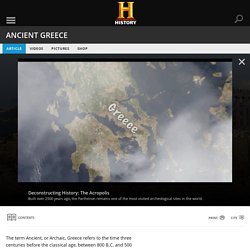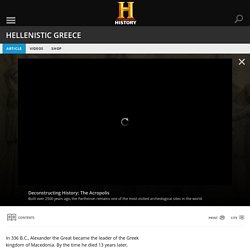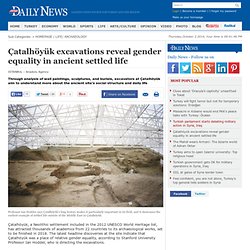

Ancient Greece - Ancient History. During the so-called “Greek Dark Ages” before the Archaic period, people lived scattered throughout Greece in small farming villages.

As they grew larger, these villages began to evolve. Some built walls. Most built a marketplace (an agora) and a community meeting place. They developed governments and organized their citizens according to some sort of constitution or set of laws. They raised armies and collected taxes. Though their citizens had in common what Herodotus called “the same stock and the same speech, our shared temples of the gods and religious rituals, our similar customs,” every Greek city-state was different. These people monopolized political power. Ancient Rome - Ancient History. The decadence and incompetence of Commodus (180-192) brought the golden age of the Roman emperors to a disappointing end.

His death at the hands of his own ministers sparked another period of civil war, from which Lucius Septimius Severus (193-211) emerged victorious. During the third century Rome suffered from a cycle of near-constant conflict. A total of 22 emperors took the throne, many of them meeting violent ends at the hands of the same soldiers who had propelled them to power. Ancient Egypt - Ancient History. Under Ahmose I, the first king of the 18th dynasty, Egypt was once again reunited.

During the 18th dynasty, Egypt restored its control over Nubia and began military campaigns in Palestine, clashing with other powers in the area such as the Mitannians and the Hittites. The country went on to establish the world’s first great empire, stretching from Nubia to the Euphrates River in Asia. In addition to powerful kings such as Amenhotep I (1546-1526 B.C.), Thutmose I (1525-1512 B.C.) and Amenhotep III (1417-1379 B.C.), the New Kingdom was notable for the role of royal women such as Queen Hatshepsut (1503-1482 B.C.), who began ruling as a regent for her young stepson (he later became Thutmose III, Egypt’s greatest military hero), but rose to wield all the powers of a pharaoh.
Hellenistic Greece - Ancient History. Alexander’s empire was a fragile one, not destined to survive for long.

After he died in 323 B.C., his generals (known as the Diadochoi) divided his conquered lands amongst themselves. Soon, those fragments of the Alexandrian empire had become three powerful dynasties: the Seleucids of Syria and Persia, the Ptolemies of Egypt and the Antigonids of Greece and Macedonia. Though these dynasties were not politically united–since Alexander’s death, they were no longer part of any Greek or Macedonian empire–they did share a great deal in common. It is these commonalities, the essential “Greek-ness” of the disparate parts of the Alexandrian world–that historians refer to when they talk about the Hellenistic Age. The Hellenistic states were ruled absolutely by kings.
Ancient History - Greece, Rome, Egypt, China & More - History.com. 7 décembre - 43. Cicéron est assassiné sur ordre de Marc Antoine et sa tête exposée au forum de Rome. Cicéron, c'est l'intello égaré au milieu des caïds de la politique.

Il croit que le verbe peut moraliser ce monde de brutes. Il le paie cash ! Lorsque Marc Antoine et Octave enterrent la hache de guerre. Le premier, qu'il a loyalement soutenu, le livre au second qui réclame sa tête. Même à l'UMP, on n'a pas ces manières. Cicéron ? Dialectique imparable Lorsqu'il revient à Rome, il se fait avocat d'affaires pour se faire du pognon et se lance simultanément dans la politique. Depuis qu'il a dégommé Catilina, Cicéron se prend pour un caïd de la politique. "Portant la main gauche à son menton... " Mais l'ex-consul Marc Antoine n'a toujours pas digéré les attaques de Cicéron contre lui et son épouse Fulvia.
Les deux assassins rattrapent la litière, la font déposer à terre. La tête et les deux mains sont clouées sur la tribune du forum romain. Recherche globale. Histoire de première secondaire - HEC - Réalité 2 - L'émergence d'une civilisation en Mésopotamie. Çatalhöyük excavations reveal gender equality in ancient settled life - ARCHA... ISTANBUL – Anadolu Agency Through analysis of wall paintings, sculptures, and burials, excavators at Çatalhöyük aim to understand more about the ancient site’s social structure and daily life Professor Ian Hodder says Çatalhöyük’s long history makes it particularly important in its field, and it showcases the earliest example of settled life outside of the Middle East in Çatalhöyük.

Çatalhöyük, a Neolithic settlement included in the 2012 UNESCO World Heritage list, has attracted thousands of academics from 22 countries to its archaeological works, set to be finished in 2018. The latest headline discoveries at the site indicate that Çatalhöyük was a place of relative gender equality, according to Stanford University Professor Ian Hodder, who is directing the excavations. “Thanks to modern scientific techniques, we have seen that women and men were eating very similar foods, lived similar lives and worked in similar works. Discoveries about the social structure. History: Ancient History in-depth.